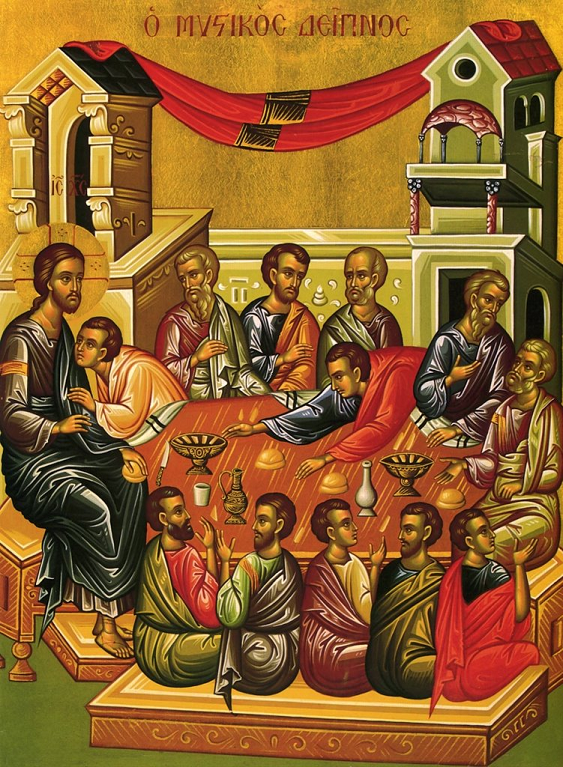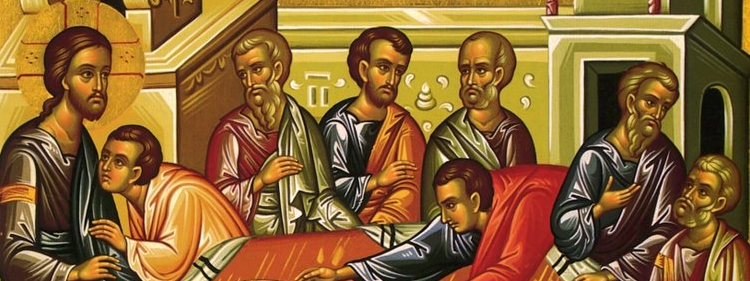The Good Gift
Maundy Thursday Scripture Readings

You’re no doubt familiar with the phrase, “Pay it forward.” It’s an obvious play on the phrase “pay-back.” Our commemoration this evening of the Lord’s Supper is a direct challenge to all of us who take part in it to “pay it forward” as Jesus did.
In the Gospel of John, Jesus eats a last meal with his disciples the day before the Passover supper, which would have taken place the next evening. We shouldn’t be too concerned about John’s timing here…he moved the Passover in his chronology to create a parallel between Jesus’s crucifixion on Friday and the sacrifice of the Passover lamb that would have occurred in the temple on that day, the preparation day for the Passover. Unlike the other evangelists, John didn’t concern himself so much with the story of the institution of the Eucharist which took place at the Last Supper. John had already covered the deeper meaning of the Eucharist in Chapter 6 of his gospel, with Jesus’s discourse on the Bread of Life. No, John’s focus was a little different.
The opening scene of the Last Supper in John’s gospel plays out in the washing of the disciples’ feet. This foot-washing is evidently a prophetic gesture. Recall that prophetic gestures were unusual actions performed by a prophet that were meant to raise questions in the minds of the observers and bring them to a significant realization. Like parables, prophetic gestures were meant to send the observers away pondering the deeper meanings. From Simon Peter’s reactions, we can surmise that Jesus’s gesture fulfilled its purpose well. However, that was then, this is now. What’s our reaction to Jesus’s prophetic gesture?
It’s evident that the symbolism of the master washing the feet of the servants is a commentary on the nature of true greatness. On several occasions, Jesus is reported to have taught his disciples that the greatest among them were those who would serve the rest. Remember when he said, “Whoever exalts himself will be humbled, and whoever humbles himself will be exalted” [Matthew 23:12, Luke 14:11, 1 Peter 5:5-6]? There’s no denying that, but we should expect that John, the author of the mystical gospel, would challenge us to go deeper and maybe discover an even more profound meaning.
John places the foot-washing at the Last Supper, the setting for the institution of the Eucharist. Even though John doesn’t mention it, its significance permeates the scene nonetheless. Everyone reading the gospel understood Eucharist. Let’s consider the word, eucharist. It’s taken directly from the Greek, ευχαριστειν (eucharistein), to give thanks. Yet the word itself is made up of two other Greek works, ευ (eu), meaning “good,” and χαρις (charis), meaning “gift.” What is this “good gift” we call Eucharist but the gift of Christ himself to the world? In his discourse on the Bread of Life, John quotes Jesus as saying, “I am the living bread that came down from heaven. Whoever eats this bread will live forever.” [John 6:51] The gift is Jesus himself, in John’s terms, the Word made flesh. The Word is the fulness of God’s communication of himself to us—to humankind. That’s what we mean by the “incarnation”—that God so immersed himself in his creation that he became an integral part of it. The Eucharist—the good gift—is nothing less than God himself manifesting himself to us in a humanly understandable way in the person of Jesus the Messiah, the Christ.
Yet, the Christ had to die. Why? Because otherwise, we would never have come to appreciate the kenosis—the emptying, the pouring-out, the total commitment—of God to us his people. God holds nothing back, and in that wholesale gift of God to us, we find not just the meaning of life, but life itself. The resurrection of Jesus is little more than a parlor trick if it has nothing to do with us. In the death of Christ, the futility and hopelessness of our human lives are put to death. In his resurrection, we are reborn to a newness of life with a new power, a new direction, and a new purpose. Our life has been transformed from the merely physical to the spiritual, and spiritual life is eternal. Our life is deathless.
So, the “good gift,” the Eucharist, our thanksgiving offering is the life of the Father poured out upon us—if only we’re willing to set aside our selfish, prideful egos and live as Jesus lived with total, unconditional love for our God and for one another. When we do that to the best of our abilities, we bring life to the world. We become Eucharist. We’ve been given a new life—a spiritual life—and, in gratitude for that good gift, we give it freely to others as it was given to us.
Now, does Jesus’s washing of his disciples’ feet make better sense in the context of the Eucharist? God continues his incarnation in and through our service to one another. The Word—which is love—becomes flesh in our love and service of others. We bring the good gift—the Eucharist—to others by making the love of God that was manifest in Christ Jesus to live again.
We understand too little about the Eucharist. As a priest, when I repeat the words of consecration, ‘This is my body,” “This is my blood,” I get it. Try it yourself. At the consecration, say those words along with me. You can’t help but sense how you, personally, are implicated in the Eucharist by those words. It’s your body, too. It’s your blood. It’s your life offered to God, transformed—transubstantiated—and given back to you to share with the world.
At the end of this liturgy, we set the Eucharist aside so that we can connect with this good gift in a very personal way. If you have the opportunity, spend some time in quiet reflection. Try to get in touch with the fact that before you is not only the life and love of the Father present in the person of Christ, but that’s also your life, your love, your destiny. It’s that—the Eucharist—that we make present and bring into our world as we wash one another’s feet. Jesus said to Peter, “What I am doing you do not understand now, but you will understand later.” This is the “later” he spoke about. To wash one another’s feet is the real presence of Jesus in the Eucharist.
Get articles from H. Les Brown delivered to your email inbox.
